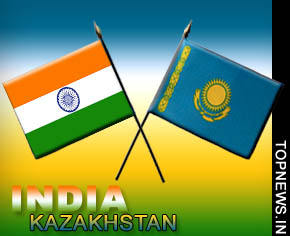India, Kazakhstan working on inter-governmental nuke energy cooperation pact
 New Delhi, July 1 : India and Kazakhstan are actively working to finalize the inter-governmental agreement for cooperation in the peaceful uses of nuclear energy, revealed Kazakhstan's Ambassador to India, Dr. Kairat Umarov, during an interaction with select media on Tuesday evening.
New Delhi, July 1 : India and Kazakhstan are actively working to finalize the inter-governmental agreement for cooperation in the peaceful uses of nuclear energy, revealed Kazakhstan's Ambassador to India, Dr. Kairat Umarov, during an interaction with select media on Tuesday evening.
Dr. Umarov said bilateral relations between both countries were progressing very well, and this was reflected when both
Prime Minister Dr. Manmohan Singh and Kazakhstan President Nursultan Nazarbayev expressed their satisfaction over the enhancement of ties on the sidelines of the recently held Shanghai Cooperation Organization (SCO) summit in Yekaterinburg, Russia.
He said that both leaders have directed their respective foreign ministers to work on a road map for promotion of a strategic partnership, with a timeline for implementing joint projects, especially in key sectors like nuclear energy, thermal power, oil and gas, petrochemicals and pharmaceuticals.
Dr. Umarov also revealed that there has been significant progress in hydrocarbons cooperation following a January 24, 2009 Heads of Agreement between KazMunaiGas National Gas Company and the ONGC. Since then, he said that the seventh meeting of the Kazakhstan-India Inter-Governmental Commission had been held in Astana in March during which all issues relating to the signing of an oil contract had been resolved by the Petroleum and Natural Gas Ministers of the two countries - Sauat Mynbayev and Murli Deora. The two companies were now working on concluding the contract, the envoy said.
He said that President Nursultan Nazarbayev has invited and offered Indian oil and gas companies to establish the first petrochemical plant in Kazakhstan, and in this regard, delegations of the ONGC, IOC and GAIL have visited Kazakhstan.
As far as bilateral pharmaceutical cooperation was concerned, Ambassador Umarov said Indian companies such as Hindustan Antibiotics would be visiting Kazakhstan from July 14 to 17 to hold talks on modalities for the setting up of a pharmaceutical plant in Almaty.
He said that bilateral trade turnover currently stands at USD 367.0 million, and 87.9 percent increase over 2007 turnover figures.
President Nazarbayev, he said, has aggressively pitched for increased foreign direct investment (FDI), especially for infrastructural and innovative projects, and believed Indian investors had a great opportunity to establish and cement their businesses in Kazakhstan, which has been listed among the 20 investor friendly countries by the World Bank.
Dr. Umarov also dwelled on Kazakhstan's non-proliferation efforts, saying that it was the first country to voluntarily give up its nuclear arsenal, which in 1989, was the fourth largest in the world.
Revealing that he had actively participated in non-proliferation movements at that time, Dr. Umarov said that a genuine nation-wide effort had seen Kazakhstan putting a complete stop to nuclear tests, and added that Kazakhstan has an impressive record in non-proliferation and disarmament efforts.
He specifically dwelt on Kazakhstan's efforts in considering a proposal to set up a nuclear fuel bank under the auspices of the Vienna-headquartered International Atomic Energy Agency (IAEA) and its initiative to push for a new global treaty that it would ensure comprehensive "vertical and horizontal" non-proliferation of nuclear weapons. This treaty is due to come up for discussion at the NPT Review Conference in 2010, he added.
He said that President Nazarbayev has called on the UN to declare August 29 as the "International Day of Nuclear Weapons Renunciation".
As far as the reconstruction of war-ravaged Afghanistan was concerned, Dr. Umarov said that Kazakhstan allocated three million dollars in 2007-08, has provided over flight rights for resupply missions to Afghanistan and permitted land transit for non-military supplies. (ANI)